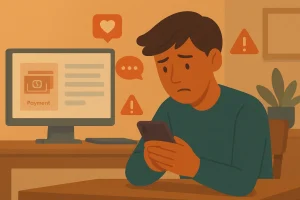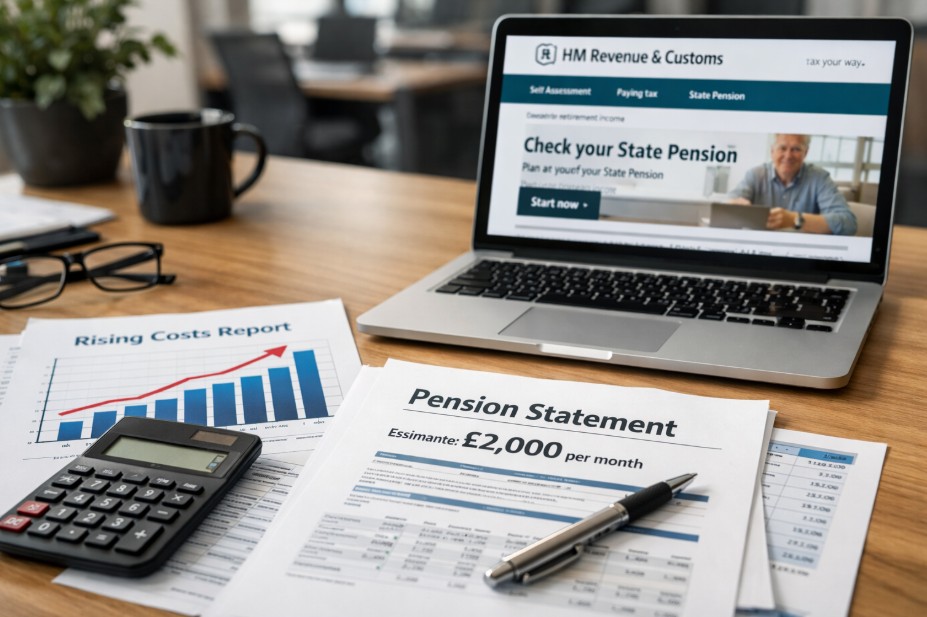Table of Contents
ToggleIn recent weeks, there has been a growing conversation across social media platforms, online forums, and community WhatsApp groups about an alleged £500 cost of living payment supposedly being issued by the UK government in late 2025. For many households already struggling with high energy bills, food costs, and mortgage pressures, such claims offer a glimmer of hope. But the essential question remains: is this payment real, or is it just another rumour?
At the time of writing, there is no official confirmation or public documentation from GOV.UK, the Department for Work and Pensions (DWP), or HMRC to support the existence of a new £500 cost of living grant. The claim appears to be entirely speculative and is not grounded in any formal government announcement or published budgetary plan.
With the cost of living crisis still affecting millions across the UK, it’s easy to see why such information spreads quickly. However, relying on verified sources is vital to avoid falling for misinformation or, worse, falling victim to scams pretending to be official support schemes.
Where Did the £500 Payment Rumour Come From?

The rumour surrounding a £500 cost of living payment appears to have originated from viral posts on Facebook and WhatsApp, with messages claiming that low-income households, pensioners, or those receiving Universal Credit would receive an additional payment in autumn 2025.
These messages were often vague, lacking any source link or official announcement, and have not been confirmed by any reputable media outlets or government departments.
The reason this rumour has gained traction is partly due to the government’s previous cost of living payments. Between 2022 and 2024, the UK government issued a range of financial support packages in response to inflation and energy price increases. Some of the most notable included:
| Payment | Amount | Eligible Groups | Year Issued |
| Cost of Living Payment | £650 | Means-tested benefit claimants | 2022 |
| Disability Cost of Living Payment | £150 | Recipients of disability-related benefits | 2022–2023 |
| Pensioner Cost of Living Payment | £300 | Pensioners eligible for Winter Fuel Payment | 2022–2023 |
| Cost of Living Instalments | £900 (total) | Universal Credit and other benefit recipients | 2023 |
These previous payments were publicly confirmed by the DWP, announced in Parliament, and widely reported across major UK news outlets. In contrast, the current £500 rumour lacks all of these markers of credibility.
What Has the Government Said About the £500 Payment?
As of October 2025, the UK government has not made any formal comment or statement regarding a £500 cost of living payment for this year. A thorough search of the GOV.UK website, the official DWP newsroom, and recent Autumn Budget Statements reveals no mention of a new cost of living grant of this amount.
In the past, the government has issued direct responses to similar rumours. For example, in 2023, a rumour circulated about a supposed £350 payment to cover energy costs. This claim was later debunked by both the DWP and reputable fact-checking websites. A similar pattern is emerging with the current £500 claim no official verification, no outlined eligibility criteria, and no payment schedule.
It’s also worth noting that government cost of living schemes are typically announced during major fiscal events, such as the Autumn Statement or Spring Budget, and are followed by thorough guidance published on GOV.UK. None of this process has occurred in relation to the £500 claim.
Are Any Legitimate Cost of Living Support Measures Available in 2025?
While the £500 payment remains unverified and likely false, the UK government continues to offer a range of genuine support schemes for individuals facing financial hardship. These measures are aimed at different demographics, including pensioners, people with disabilities, and those receiving means-tested benefits.
For 2025, confirmed support includes:
- Winter Fuel Payment, ranging between £100 and £300, for those born before a certain date.
- Cold Weather Payment, which provides £25 per eligible week when temperatures drop below a certain threshold.
- Disability Cost of Living Payment, currently set at £150 for recipients of Personal Independence Payment (PIP), Disability Living Allowance (DLA), or Attendance Allowance.
- Household Support Fund, which is distributed by local councils to assist with essentials like food, heating, and housing costs.
These payments have clear eligibility criteria, official payment schedules, and are backed by government funding. Unlike the rumoured £500 grant, they are not based on speculation or hearsay.
How Can You Verify If a Government Payment Is Real?

Identifying whether a cost of living payment is real or fake requires careful attention to the source of information. Government payments are always announced publicly, and the information is widely circulated through multiple reliable channels.
To verify whether a support scheme is genuine, consider the following steps:
- Visit the official GOV.UK website, which is the definitive source for government updates and policy changes.
- Check the Department for Work and Pensions newsroom, which provides press releases and statements directly from the source.
- Follow HMRC and DWP on social media, particularly on Twitter/X, for official real-time announcements.
- Refer to reputable UK news sources such as the BBC, ITV News, or The Guardian, which regularly cover public policy developments.
If a payment is not listed or mentioned in any of these outlets, it should be treated with caution. Moreover, if the message includes spelling errors, unusual links, or requests for personal information, it’s very likely to be part of a scam.
Why Do Rumours Like the £500 Payment Spread So Easily?
The cost of living crisis continues to affect households across the UK. With rising energy prices, increased mortgage rates, and food inflation, many people are under financial stress. In this environment, any suggestion of extra financial support no matter how implausible, can quickly gain attention.
Rumours like the £500 payment often appeal to hope, but they are frequently spread by:
- Social media posts with no sources
- WhatsApp chain messages repeating unverified claims
- Clickbait articles designed to attract ad revenue
- Scam emails or text messages asking for personal data
Because past government payments were real and helpful, it becomes easier for rumours to seem believable. However, relying on such unverified claims can create confusion and undermine public trust in real support programmes.
Could the Government Introduce a £500 Payment in the Future?

Although no such payment has been announced at this time, the government could introduce new cost of living support in the future if economic conditions worsen. Payments like this would likely follow a process:
- Announcement in a Budget or Autumn Statement
- Press release from the DWP or Treasury
- Listing on GOV.UK with full eligibility criteria
- Clear timeline for payments and application (if required)
Any future cost of living support would be determined by factors such as inflation, public spending reviews, and political priorities, especially with a general election approaching.
Until then, it’s best to remain cautious of unverified financial claims no matter how widely they are shared online.
What Should You Do If You See This Claim Being Shared?
If you encounter claims about a £500 cost of living payment on social media, forums, or messaging apps, it’s important to take a measured approach. Misinformation can spread quickly and potentially lead people into fraudulent traps.
The most appropriate actions are:
- Avoid resharing the post, especially if it lacks a credible source.
- Politely correct the misinformation if shared within your community or network.
- Report suspicious links or scam content to the platform on which it appears.
- Guide people to official sources such as GOV.UK or Citizens Advice.
Education and awareness are key to limiting the impact of financial misinformation, especially when vulnerable households may be relying on such information to make urgent decisions.
Conclusion: Why Facts Matter in the Face of Financial Misinformation
The rumoured £500 cost of living payment currently circulating online is not supported by any official statement or credible source. It appears to be part of a wider trend of misinformation that emerges in response to economic hardship.
While the intent behind sharing such rumours may be hopeful or well-meaning, it is critical to ensure that information about public funding and financial support is accurate and verifiable.
The UK government continues to offer real support in 2025 through programmes like the Winter Fuel Payment, Cold Weather Payment, and Disability Cost of Living Payment. These are confirmed, structured, and publicly documented.
In times of uncertainty, the best course of action is to remain informed, check facts, and share only information from verified, official sources. By doing so, individuals can avoid confusion, protect themselves from fraud, and make use of the support that is genuinely available.
FAQs About the £500 Cost of Living Payment Rumour
Is the £500 cost of living payment confirmed by the government?
No, the UK government has not confirmed any such payment. It appears to be a social media rumour with no basis in official policy.
Why are people talking about this payment if it’s not real?
The rumour likely stems from past government support payments, leading people to assume a similar scheme may be launched again. However, there is no evidence to support this claim.
Can I apply for the £500 cost of living payment?
No. There is no application process because the payment has not been announced or approved by any government body.
Are there any other payments I can claim in 2025?
Yes. Confirmed support includes the Winter Fuel Payment, Cold Weather Payment, and the Disability Cost of Living Payment.
Where should I check for real updates on government payments?
Always refer to GOV.UK, the DWP newsroom, and reputable UK news platforms for the latest updates.
Is this rumour dangerous?
It can be. Misinformation can lead to scams or false expectations, particularly among vulnerable people looking for help.
What should I do if I receive a message about this payment?
Avoid sharing it, verify through official sources, and report any suspicious content or links to the appropriate platform.




